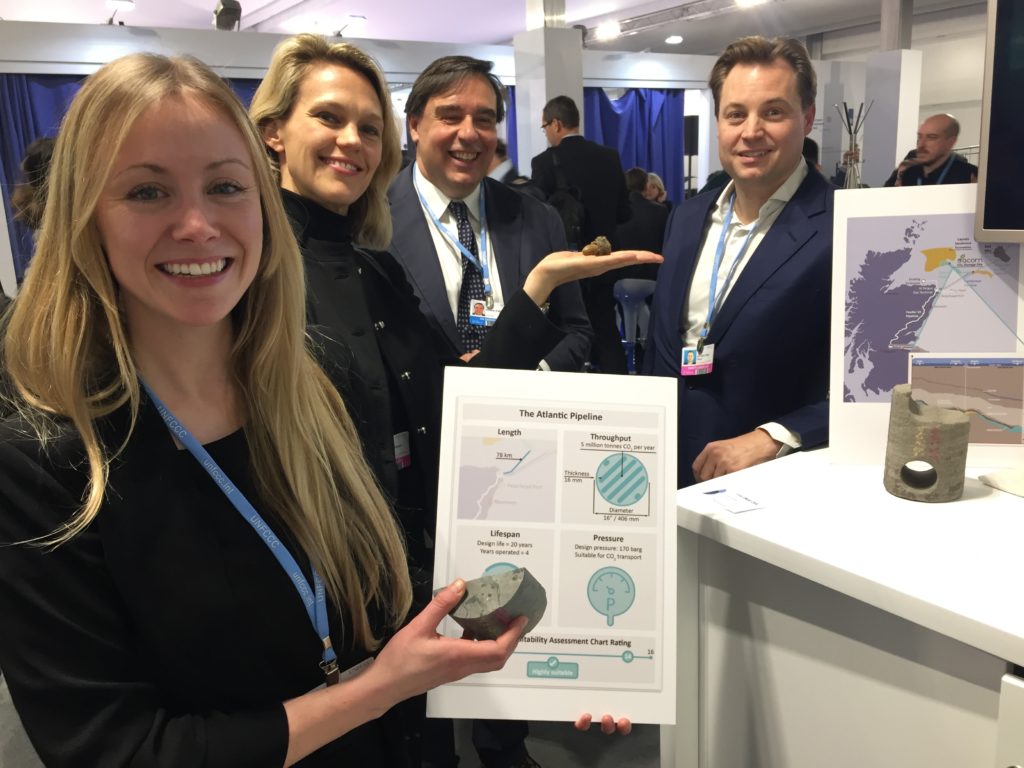
Pale Blue Dot Energy, the company behind the Acorn Carbon Capture and Storage site at St Fergus, writes for Energy Voice from the COP24 conference in Katowice, Poland.
In October 2018, the Intergovernmental Panel on Climate Change (IPCC) – the United Nations (UN) body for assessing the science related to climate change, issued a special report with its starkest warnings yet about the current and future state of our climate. The ripple effects of this international report are beginning to play out in the UK with the Government writing to the UK Committee on Climate Change (CCC) for advice on the further action needed to meet the ambitious goals of the Paris Agreement.
Carbon capture usage and storage (CCUS) is one of the climate mitigation technologies that has long played a vital CO2 emission reduction role in the scenarios put forward by both the IPCC and the CCC, yet it is a technology that has struggled to be established in the UK and in Europe. However, the tides appear to be changing.
Accelerating CCUS
In Edinburgh last month, UK Energy and Clean Growth Minister Claire Perry hosted an international summit focused on accelerating CCUS deployment and establishing the UK’s “…world-leading ambition for developing and deploying carbon capture and storage technology to cut emissions.” She went on to state, “the time is now to seize this challenge to tackle climate change while kick starting an entirely new industry.”
This week, the international promotion of the fledgling UK CCUS industry has continued at the UK Pavilion of the UN’s major global climate conference – COP24 in Katowice, Poland. Pale Blue Dot Energy, have been there this week showcasing Acorn CCS – one of the UK’s most advanced CCS initiatives, as part of the UK Government and Global CCS Institute’s COP24 ‘Accelerating CCUS Deployment’ event at the UK Pavilion.
A call for action and a focus on finance
A capacity crowd gathered at the UK Pavilion to hear an impressive spread of organisations and countries debate the key challenges and solutions to scaling-up and financing CCUS technologies and the policies and support that is required to help with the widespread deployment of CCUS globally.
David Turk the Director of the International Energy Agency (IEA) highlighted the global importance of CCUS, explaining that recent IEA analysis shows that CCUS gives the world very important “room to maneuver” and quoted the IEA Chairman Dr Fatih Birol who said: “Without CCUS as part of the solution, meeting climate goals will be practically impossible.”
However, Riccardo Pulti from the World Bank warned: “CCUS is not well understood in the financial community, where it is linked to where it was 20 years ago. We have to move forward and explain that CCUS applies to other sectors and keep focused that CCUS is required to meet the 1.5C target. There is momentum now, but we can lose it quickly”
There was consensus that the slow rate of global deployment of CCUS to date is not due to technical shortcomings, but a lack of financing, which is driven by policy and a lack of quickly deployable projects. John Scowcroft from the Global CCS Institute was warmly supported in his call for more projects to be deployed: “deployment is still too slow, it is time to jump start the next wave of facilities.”
As a recognised European Project of Common Interest, the Acorn CCS showcase initiated lots of important discussion on the potential cost and time savings available from strategic reuse of legacy oil and gas assets such as pipelines, and offered a great opportunity to highlight, on this major international stage, the important contribution that an area like north-east Scotland can make as part of the global energy transition and to CCUS deployment.
The messages emerging from our COP24 experience are clear, the time for debate and discussion are past. Tackling climate change relies on widespread action across the full suite of climate mitigation technologies and CCUS is a critical and proven technology that through the rapid deployment of low-cost, low-risk projects like Acorn CCS could offer an exciting opportunity for the UK to demonstrate real CO2 mitigation commitment on a world stage.

